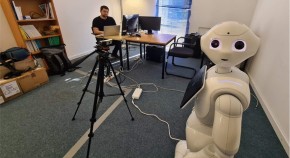Collection
Embodied Agents for Wellbeing
- Submission status
- Closed
Editors
-
Micol Spitale
Micol Spitale is currently a PostDoc at the Affective IntelligenceMicol & Robotics Laboratory (AFAR Lab), Department of Computer Science & Technology of the University of Cambridge, under the supervision of professor Hatice Gunes. Her research focuses on developing a Socio-emotionally Adaptive Robotic (ARoEQ) platform that can foster wellbeing through coaching and psychologically-proven interventions. She has just finalised her Ph.D. (end of October 2021) in Information Technology (Computer Science and Engineering Area) affiliated with IBM Italy and co-funded by EIT Digital.
-
Katie Winkle
Katie Winkle is an Assistant Professor at the Department ofKatie Information Technology, Uppsala University, where she is developing new lines of research around trustworthy Human Robot Interaction (and what that means) at the Social Robotics Lab. Her research interests cover the design, development, evaluation and application of socially assistive robotics, with a focus on human-in-the-loop design/development and mutual shaping approaches which recognise the two-way interaction between robots and society.
-
Emilia I. Barakova
Emilia I. Barakova received a Ph.D. degree in mathematics andEmilia physics from Groningen University, Groningen, The Netherlands, in 1999 and holds a Master’s degree from the Technical University of Sofia, Bulgaria. She is currently with the Department of Industrial Design, Eindhoven University of Technology, Eindhoven, The Netherlands, and leads the Social Robotics Lab of the Eindhoven University of Technology. She has held research positions at RIKEN Brain Science Institute (Japan), GMD-Japan Research Laboratory (Japan), Groningen University (The Netherlands), and the Bulgarian Academy of Science (Bulgaria).
-
Hatice Gunes
Hatice Gunes is a Professor of Affective Intelligence andHatice Robotics (AFAR) and the Head of the AFAR Lab at the University of Cambridge's Department of Computer Science and Technology. Her expertise is in the areas of affective computing and social signal processing cross-fertilising research in multimodal interaction, computer vision, signal processing, machine learning and social robotics. She has published over 125 papers in these areas (H-index=34, citations > 6,500), with most recent works on lifelong learning for facial expression recognition, fairness and affective robotics; and longitudinal HRI for wellbeing.
Articles (10 in this collection)
-
-
Analysing Children’s Responses from Multiple Modalities During Robot-Assisted Assessment of Mental Wellbeing
Authors (first, second and last of 6)
- Nida Itrat Abbasi
- Micol Spitale
- Hatice Gunes
- Content type: OriginalPaper
- Open Access
- Published: 13 June 2024
- Pages: 999 - 1046

-
A Psychological Need-Fulfillment Perspective for Designing Social Robots that Support Well-Being
Authors
- Suzanne Janssen
- Bob R. Schadenberg
- Content type: OriginalPaper
- Open Access
- Published: 25 February 2024
- Pages: 857 - 878
-
Robot-Mediated Nudges for Workplace Health: Not a One-Size-Fits-All Modeling Problem
Authors (first, second and last of 4)
- Rhian C. Preston
- Kenna Dinsdale
- Naomi T. Fitter
- Content type: OriginalPaper
- Open Access
- Published: 26 December 2023
- Pages: 899 - 918

-
Building Long-Term Human–Robot Relationships: Examining Disclosure, Perception and Well-Being Across Time
Authors (first, second and last of 4)
- Guy Laban
- Arvid Kappas
- Emily S. Cross
- Content type: OriginalPaper
- Open Access
- Published: 30 November 2023
- Pages: 1 - 27

-
“It Brings the Good Vibes”: Exploring Biomorphic Aesthetics in the Design of Soft Personal Robots
Authors
- Mads Bering Christiansen
- Ahmad Rafsanjani
- Jonas Jørgensen
- Content type: Original research
- Open Access
- Published: 02 November 2023
- Pages: 835 - 855

-
Multi-modal Affect Detection Using Thermal and Optical Imaging in a Gamified Robotic Exercise
Authors (first, second and last of 4)
- Youssef Mohamed
- Arzu Güneysu
- Iolanda Leite
- Content type: OriginalPaper
- Open Access
- Published: 31 October 2023
- Pages: 981 - 997

-
A Brief Wellbeing Training Session Delivered by a Humanoid Social Robot: A Pilot Randomized Controlled Trial
Authors (first, second and last of 4)
- Nicole L. Robinson
- Jennifer Connolly
- David J. Kavanagh
- Content type: OriginalPaper
- Open Access
- Published: 12 October 2023
- Pages: 937 - 951

-
Could Socially Interactive Architectural Robotics Promote Restorative Environments?
Authors (first, second and last of 5)
- Sharmayne Lim Zhiyu
- Hong Pin Koh
- Yixiao Wang
- Content type: Original research
- Published: 25 August 2023
- Pages: 919 - 936

-
Robot Gaze During Autonomous Navigation and Its Effect on Social Presence
Authors (first, second and last of 5)
- Kerry He
- Wesley P. Chan
- Elizabeth A. Croft
- Content type: OriginalPaper
- Open Access
- Published: 25 June 2023
- Pages: 879 - 897






